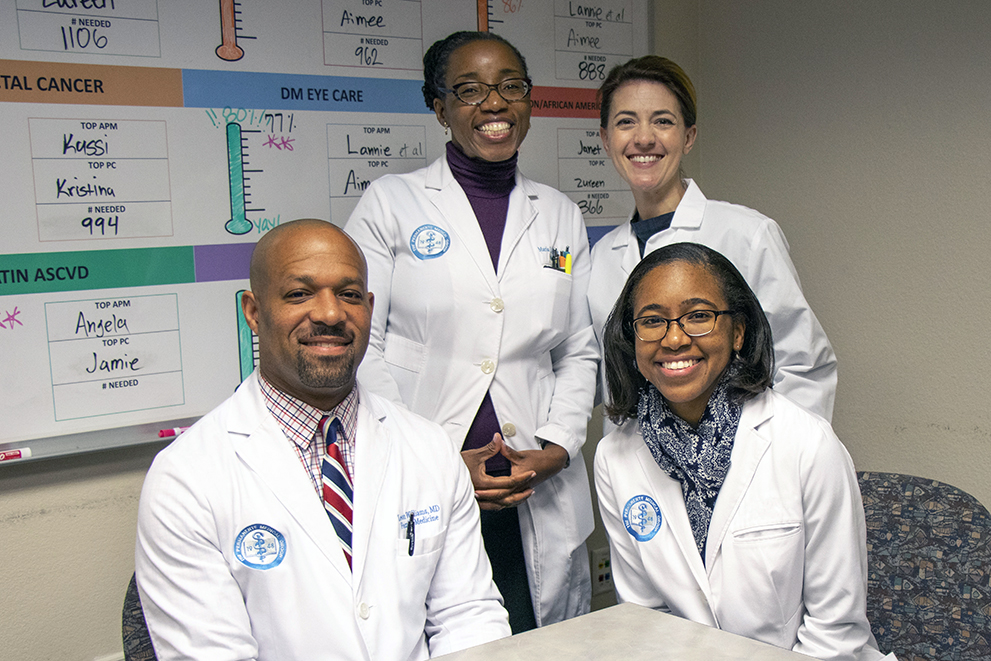South Sacramento physicians use a telephone talk show to educate populations with unequal instances of disease. (Pictured sitting are Leon Williams, MD, at left, and Kristin Gates, MD at right; standing are Maria Mba Wright, MD, at left, and Hillary Van Horn-Gatlin, PhD, Chair, Regional Behavioral Medicine, at right.)
Hispanic Americans are 69 percent more likely than whites to have diabetes, according to the Centers for Disease Control and Prevention.
Black Americans are 50 percent more likely to die of heart disease or stroke before they reach age 75.
Targeting these health disparities and others among its 213,000 South Sacramento members is the new aim of an educational, bilingual telephone talk show for Kaiser Permanente patients called House Calls, hosted by physicians once a month.
The interactive show began in 2016 and has logged about 66,000 callers to an English language version and around 3,250 callers to shows in Spanish, said Dr. Maria Mba Wright, a pediatrician and native Spanish speaker who leads those calls.
Hillary Van Horn-Gatlin, PhD, Behavioral Medicine chair of chiefs for Kaiser Permanente Northern California, leads the English language version of the shows. This year Van Horn-Gatlin and Dr. Mba Wright decided to focus the content on health disparities facing minority populations.
Past shows have included more general topics such as the importance of mammograms, avoiding the flu, and skills to stop smoking.
By calling patients who have indicated a desire to learn about healthy living, physicians hope to better the lives and longevity of those they treat, said Dr. Mba Wright.
“We’re doing this because we want to improve the health in those populations,” Dr. Mba Wright said. “With certain groups like blacks with hypertension or Latinos with diabetes, we hope to make improvement.”
She said the goal is to improve patients’ compliance with medication, get patients to make follow up appointments with their doctors or make a mammogram appointment, for example.
Touch-tone telephone features allow patients to make appointments during the call, ask a question, schedule a screening or take a poll, Dr. Mba Wright said.
The first 2 shows of this year included 1 on diabetes for Spanish speakers, hosted by the husband and wife team of Drs. Illiana and Jonier Rodriguez, April 2, and one on high blood pressure specifically for black patients hosted by Dr. Kristin Gates and Dr. Leon Williams on February 26.
Getting the Patient Perspective
Dr. Mba Wright said a second goal of the program is for doctors to listen and learn why certain groups have lower health outcomes than others.
“We want to find out why they are struggling with medication compliance and why there is a struggle with understanding and trust between the patient and the provider,” she said.
Dr. Mba Wright said Spanish speakers in South Sacramento, for example, have different beliefs and understandings on how to treat diabetes.
“You could lose a foot or go blind from diabetes, but many in this population don’t know that,” Dr. Mba Wright said. “We want to understand if the medication is too expensive or if there is a barrier to getting blood test kits, or is it something else? There are a lot of layers, but the cool part is we elicit the patient perspective. We’re learning, and the patient is learning, too.”
Van Horn-Gatlin, who moderated the show for black members with hypertension, noted that 20 percent of blacks have elevated blood pressure compared to 10 percent of whites.
“Even if we can make a difference in 1 or 2 people who get into their primary care physician to have a conversation about their health, we consider that a win,” Van Horn-Gatlin said. “And I think we have the momentum, passion, and expertise to extend this program beyond our medical center.”





This Post Has 4 Comments
Wow, I have been a Kaiser member for almost 40 years (1981) and I must say this visual and vision embraces the inclusionary approach that is so refreshing to see. Having representation and trusted brokers reaching out to all communities is a welcomed sight. Continue and expand this approach. As more and more generations become technically advanced, I know your targeted audience will only grow.
May this yield health improvements for many. Thank you for undertaking it.
Two questions: I was unable to access the House Calls recordings. Might that be because I’m not a Sacramento member, or simply a technical mistake?
Can you clarify how patients know to listen in – did the physicians specifically invite each of the 69,250 members?
Hello. Thank you for writing in.
The link to the house calls recording web pages works for us inside and outside of Kaiser Permanente.
In answer to the second question, yes, physicians specifically invite each of the members who listen to the live call.
We hope this helps.
What a great approach! Thank you for sharing this valuable work with others in the organization.